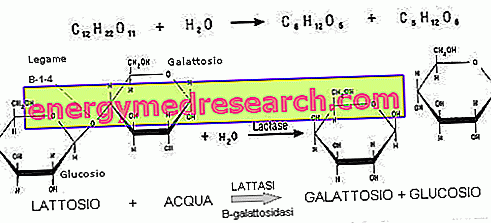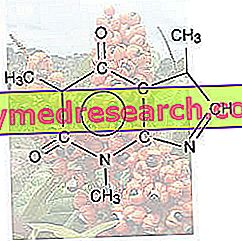Galactosidases are a group of enzymes responsible for the hydrolysis of galactosides in monosaccharides.
All the molecules characterized by: are defined as galactosides:
- a carbohydrate portion containing galactose (present as a monomer or part of an oligosaccharide)
- an organic, non-carbohydrate, molecular part, called aglycone or genin.
Depending on whether the glycosidic bond is "above" or "below" the plane of the galactose molecule, galactosides are classified as α- or β-galactosides. The most important of these is lactose. Similarly, in relation to hydrolysable bonds, galactosidases take the name alpha or beta galactosidase respectively.
The most important beta galactosidase is lactase, which - secreted by the mucosa of the small intestine - presides over the digestion of lactose ingested with food, drugs and supplements, in the two monomers that constitute it: glucose and galactose.

Lactose taken orally is digested in the jejunum by betagalactosidase, an enzyme secreted from the intestine which releases glucose and galactose.
Galactosidases as supplements
Lactose intolerance
Lactase is particularly active at birth, but immediately after weaning it undergoes a clear functional decline. This phenomenon occurs in all mammal species and is responsible for the so-called lactose intolerance; in fact, in the presence of a scarce lactase activity, the ingestion of this sugar produces a symptomatic procession characterized by swelling, abdominal cramps and diarrhea. The only way to control these disorders is to adopt a so-called exclusion diet, based on the prevalent consumption of lactose-free foods and on the more or less scrupulous moderation of the foods containing it; all based on individual tolerance (for example, some people with lactase deficiency tolerate yogurt and hard cheeses, while others are forced to exclude them).
A palliative (remedy that does not cure the disease but mitigates the symptoms) is represented by the simultaneous use of lactase, to be ingested together with products containing lactose to allow digestion thus avoiding the onset of swelling, poor digestion, flatulence and heartburn.
Non-digestible oligosaccharides
Alpha-galactosidase is an enzyme absent in humans, essential for the digestion of certain carbohydrates (verbascose, raffinose and stachiosio). These oligosaccharides contained in legumes cause flatulence, because they are indigestible and non-absorbable, but fermentable by the microbial flora residing in the large intestine.
An adequate exogenous intake of alpha-galactosidase (via drugs or supplements) allows the raffinose, stachiosio and verbascose to be broken down into fructose, glucose and galactose before they reach the colon. Therefore, α-galactosidase prevents these carbohydrates from becoming an anaerobic fermentation substrate, preventing the formation of gases (such as carbon dioxide, hydrogen and methane).
Alpha-galactosidase, like charcoal, can also be administered during preparation for abdominal ultrasound; this practice aims to obtain a better ultrasound visualization of the organs studied.



